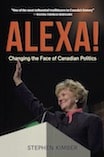
You should.
I can’t.
What do you mean, you can’t? Of course, you can.
But I’m a social worker.
I was a social worker.
I have two young kids.
I had three young kids.
But if I ran, I’d have to run against my husband’s law partner.
That’s okay. I ran against my husband’s medical partner for my nomination. And I beat him.
But I don’t know enough.
Not good enough.
This conversation happened in Halifax in the spring of 1977. The You–Should in this conversation was Rosemary Brown, a forty-seven-year-old Jamaican-born Canadian then serving as a New Democratic Party (NDP) member of the British Columbia legislature. She was the first Black woman ever elected to any legislature in Canada. Two years earlier, she’d been the first Black woman to run for the leadership of a Canadian federal political party.
That was how she and I–Can’t came to be in Halifax having this conversation.
I–Can’t was Alexa McDonough, a thirty-three-year-old Nova Scotian woman on the last legs of her long, unsuccessful run to escape what writer Harry Bruce would later call her “invisible hound of destiny.” She still seemed more constrained by the sum of all the moving parts of her life — the silver-spoon daughter of the millionaire socialist, the wife of the corporate lawyer, the mother of two young sons, and member in awkward standing among South End Halifax’s conservative elite — than freed by the scope of her personal possibilities. But she was already chafing at the limitations of the traditional values of her place and time, seeking ways to integrate her own evolving feminism and increasing political activism into a future she couldn’t yet imagine for herself.
At her mother’s urging, she’d read The Feminine Mystique, Betty Friedan’s landmark book that challenged the still-prevailing 1950s presumption that truly “feminine women” preferred domesticity to a life of the mind, or a career, or, certainly, political activism. The book’s influence on the young Alexa was seminal.
After her 1966 marriage to lawyer Peter McDonough, she had found a satisfying career in social work and, while pregnant with her first son, also negotiated with her employer, the City of Halifax, the municipality’s first maternity leave with the guarantee she could return to her old job. And she’d become politically active. After a brief, disillusioning flirtation with the Nova Scotia Liberal Party, she’d returned to the CCF/NDP politics of her parents.
In 1973, her father, Lloyd Shaw, bought her a plane ticket to attend a conference on democratic socialism at the University of Regina. But it was her mother, Jean, who sagely suggested she share a dorm room with Grace MacInnis, a family friend, the daughter of one of the party’s founding fathers and the only woman, among 263 men, elected to the House of Commons in 1968. Alexa McDonough was impressed — and inspired, “exceptionally inspired,” by MacInnis. But she was still a social worker with a husband and two small kids. What was she supposed to do with inspiration?
In 1974, she had served as campaign manager for social activist Muriel Duckworth’s unsuccessful NDP bid for the Nova Scotia legislature and had become the president of her local constituency association. She was selected — along with her mother and father — as a delegate to the 1975 NDP national leadership convention.
The front-runner was Ed Broadbent, a former university professor who’d been a Member of Parliament (MP) since 1968. Alexa’s father supported Broadbent, the party establishment’s candidate. Alexa did not. She’d served on the federal party’s participation of women committee with Rosemary Brown, who had helped found the Vancouver Status of Women Council and championed the notion that women’s rights were human rights. “Rosemary emerged as a rock star,” Alexa would recall years later. “She galvanized the women’s movement.”
Once Brown announced her leadership bid, Alexa informed her father she’d be voting for Brown; he wasn’t thrilled. He was less happy when his wife, Jean, declared: “You can support Broadbent, Lloyd. That’s fine, but I’m supporting Rosemary Brown.”
“There was upheaval in my household, the likes of which I don’t remember before or since,” explained Alexa, who noted her mother’s decision to strike out on her own after so many decades of walking in political lockstep with her husband marked a “clenching of the sisterhood between me and my mother.”
Brown came second but closer than expected, taking 40 per cent of the vote. Two years later, she called Alexa, whom she now knew through NDP and various feminist circles as well as through Alexa’s friendship with Brown’s brother, Gus Wedderburn, a respected Halifax social justice advocate. “Can I come and stay with you and Peter?” Brown asked. “I’m just totally exhausted.”
Of course. The McDonoughs had a small basement apartment in their house where she could “hide out.” And, of course, she and Brown talked. And talked. About anything and everything. Including the notion Alexa should run for office herself. Brown parried every Alexa “I can’t” with her own “you should.” McDonough soon ran out of defences. “If you run,” Brown added by way of sweetener, “I will come and speak for you.”
And the rest, as they say, is history.
Well, not exactly.
—
Other excerpts:
***
Excerpted from Alexa by Stephen Kimber. Copyright 2021.




 STEPHEN KIMBER, a Professor of Journalism at the University of King's College in Halifax and co-founder of its MFA in Creative Nonfiction Program, is an award-winning writer, editor and broadcaster. He is the author of two novels and eight non-fiction books. Buy his books
STEPHEN KIMBER, a Professor of Journalism at the University of King's College in Halifax and co-founder of its MFA in Creative Nonfiction Program, is an award-winning writer, editor and broadcaster. He is the author of two novels and eight non-fiction books. Buy his books
THE LATEST COMMENTS